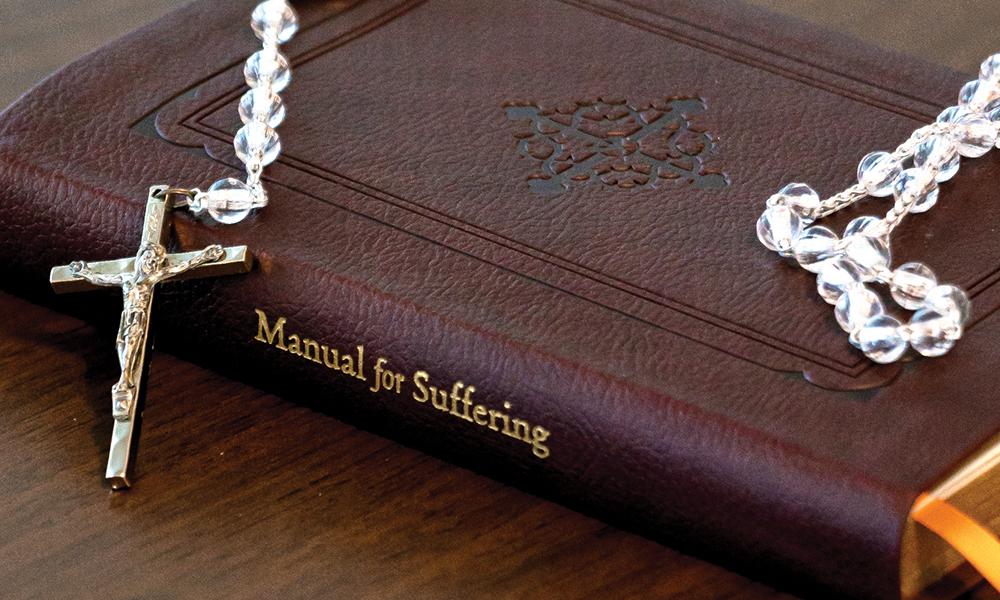
The Manual for Suffering Helps Tackle One of Life’s Hardest Questions
It is human nature to question the divine intentions of our Lord when something terrible happens. When we see someone we love suffering, or when we hear about an awful situation that a fellow human being is in, we wonder: why would God allow suffering?
It is human nature to question the divine intentions of our Lord when something terrible happens. When we see someone we love suffering, or when we hear about an awful situation that a fellow human being is in, we wonder: why would God allow suffering?
Father Jeffrey Kirby, STL, pastor of Our Lady of Grace Church in Lancaster, decided to write about this frequently asked question.
In his Manual for Suffering, he addresses what everyone is thinking as they stand over a loved one’s deathbed. It addresses the thoughts running through our minds when we hear extremely bad news.
Father Kirby said, “The manual came from a series of homilies I gave at my parish during the pandemic on the cause and meaning of suffering.”
He said that as the pandemic wore on, many people in his parish would ask him why God would even allow a pandemic to happen and what they were supposed to do with it.
“These are very human questions and divine wisdom can help us answer them,” he said. “At times, in our comfort and routine, we can neglect these questions or forget why it’s important for us to pursue answers to them.”
In the book, Father Kirby described a situation where he entered the hospital room of a woman dying of cancer. Her son was upset and asked, “Father, this is terrible. I can’t believe this is happening. Please help me. Please explain why God would let my mother suffer like this.”
The priest answered that “in a pastoral situation, the best approach is one of comfort and encouragement. It’s oftentimes not the place for extended explanations or pious platitudes. When there is time, the best approach to the question of suffering is the broader perspective of why there is suffering at all. This can help a person to realize that while their suffering is uniquely their own, they are not alone. Suffering is a shared experience within the human family.”
He went on to explain that suffering was actually not a part of God’s original plan for the world.
“Suffering came as a consequence of original sin. It is permitted by God as a means for us to grow, to love, to be united with God and others and to ultimately work out our salvation in Jesus Christ.”
Father Kirby also added that God permits suffering so that a greater good can come of it, which could provide comfort in terms of the pandemic and why we are all currently enduring such a difficult time with it. Perhaps there is a deeper reason why. Perhaps it will get us closer to a greater good down the road.
“Such goodness, however, can also be seen at different times in this life, such as reconciliation between loved ones, deeper gentleness to those around us, renewed affection for family members and other graces such as these,” he said.
Suffering is something that cannot be defined as worse for one person or another. Whether physical, mental, psychological, familial or even spiritual — suffering is relative to what we are all dealing with and as author Ian Maclaren said in the 1800s, “Be kind, for everyone you meet is fighting a hard battle.”
“When people suffer, I encourage them to be as transparent in prayer as they’re able. If they are angry, they need to tell God,” Father Kirby said. “If they feel lonely, they need to tell God. If they’re just fed up with being sick, they need to tell God. Prayer should be an active exchange between God and the person. There is no room for misplaced piety or religious platitudes. The person who is suffering is having things taken from them. In their vulnerability, they need to be honest with God and express to him exactly what is on their hearts. Eventually, through open prayer, the Holy Spirit will help the person to come to the awareness of God’s plan and the purpose of suffering.”
As for those being asked the question, “Why do people suffer?” Father Kirby advised, “As people who accompany those who suffer, we shouldn’t try to impose real truth onto a person’s experience before they are ready to receive it. Caregivers and those who walk with people who suffer should not attempt to resolve their own discomfort by asserting real truth at the wrong time.”
Along with being the pastor of Our Lady of Grace, Father Kirby is a Papal Missionary of Mercy and an adjunct professor of theology at Belmont Abbey College. He holds a doctorate in moral theology from Holy Cross University in Rome. Along with the Manual for Suffering, Father Kirby has authored several books including We Are the Lord’s: A Catholic Guide to Difficult End-of-Life Questions.
The Manual for Suffering can be found on Amazon.com.
